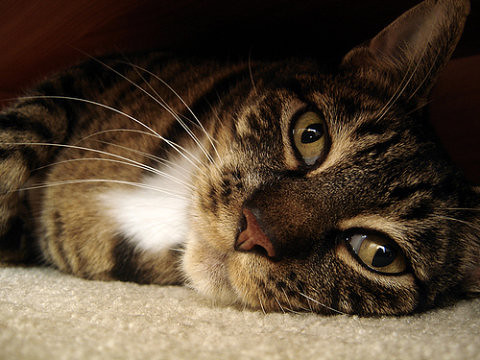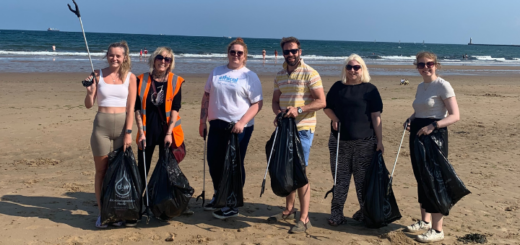Stroke the cat

The first thing I did this morning when the kids went out of the door after two weeks off school was to go down the garden and sit by the pond for ten minutes. The sun was shining and the pond was teeming with life….snails, tadpoles and a million other unidentified wriggly things. This observation of nature at work so close to home brought a smile to my face, calmed my anxieties, and restored my soul.
It led me to reflect that the highlight of my youngest children’s Easter holidays was going up to the lake with my son and his girlfriend and her three dogs. Not because they hadn’t done anything more conventionally exciting, but because they too respond positively to fresh air and interaction with animals.
I’m not telling you anything new. We all know that animals do us good. Even the toughest among us will go soft over a baby kitten. Jonathan Ross seems to have a particular soft spot for photos of baby animals on his late night Friday show – his pride over his namesake, the rescued baby badger, was obvious.
“You should stroke the cat more”.
This was my husband’s answer to my irritability over the weekend.
Probably true. Stroking the cat does calm me.
Unfortunately, I was way past calming at that point!
Many of us would consider ourselves to be animal lovers and would agonise over an injured bird, swerve for a pheasant and stop the cat massacring a mouse.
But what about the things that we do that are directly harmful to the animals in the world around us?
If we could see the damaging effects of phosphates, which are used to soften hard water, would we change our dishwasher tablets?  Phosphates contribute to eutrophication in rivers, the excessive growth and subsequent decay of primary plant life due to overcrowding. The resulting lack of oxygen affects all that lives in the rivers and consequently, all the birds and mammals that feed on what lives in the rivers. Would you rather stick to your preferred dishwasher tablets or enjoy spotting wildlife on riverside walks for years to come?
Phosphates contribute to eutrophication in rivers, the excessive growth and subsequent decay of primary plant life due to overcrowding. The resulting lack of oxygen affects all that lives in the rivers and consequently, all the birds and mammals that feed on what lives in the rivers. Would you rather stick to your preferred dishwasher tablets or enjoy spotting wildlife on riverside walks for years to come?
If we could see the effect of surfactants on a frog’s skin, would we change our washing up liquid? Surfactants lower the surface tension of a liquid and are found in most cleaning products. Once they arrive in the rivers, they destroy the protective coating on a frog’s skin. Would you rather keep buying the same washing up liquid or feel that you are contributing to the protection of frogs in their natural environment?
If we really understood the effect of the petrochemicals in our cleaning agents on aquatic life, would we change our multi-surface cleaner? Petrochemicals are undeniably harmful to the life in our oceans. Moreover, they do not biodegrade and are sourced from unsustainable resources. Would you rather continue using your usual multi-surface cleaner or enjoy scuba diving amongst shoals of fish for many years to come?
If we knew that pleasant artificial fragrances remained potent even when washed back into the rivers and that this fragrance can confuse butterflies and other insects, would we change our bathroom cleaner? This confusion has been shown to interfere with the life cycle of these creatures and has been linked to the increased scarcity of butterflies. Would you like to remain loyal to your bathroom cleaner or be able to count how many different butterflies you can see in the garden on a summer’s day?
Ecover does not use phosphates in any of its products.
Ecover ensures its surfactants biodegrade before reaching the natural environment.
Ecover uses plant-based ingredients which biodegrade completely and leave minimal traces in the natural environment, as well as being wholly sustainable.
Ecover uses only natural plant-based fragrances in their products.
Visit the Ecover website and prepare to have your eyes opened.
We consider ourselves to be a nation of animal lovers and yet we turn a blind eye to the effects of the products we choose to use. What we don’t know won’t harm us. But it will harm wildlife. It will harm aquatic life. It will harm the environment. And ultimately, it will harm our quality of life, as the natural living environment is changed by what we pour down our drains.
Time to stroke the cat.
Cat image via Flickr



All good thoughts…but I just want to point out that Ecover is not BUAV approved, as they have a 5-year rolling policy on animal testing. Bio D, however, is BUAV approved.